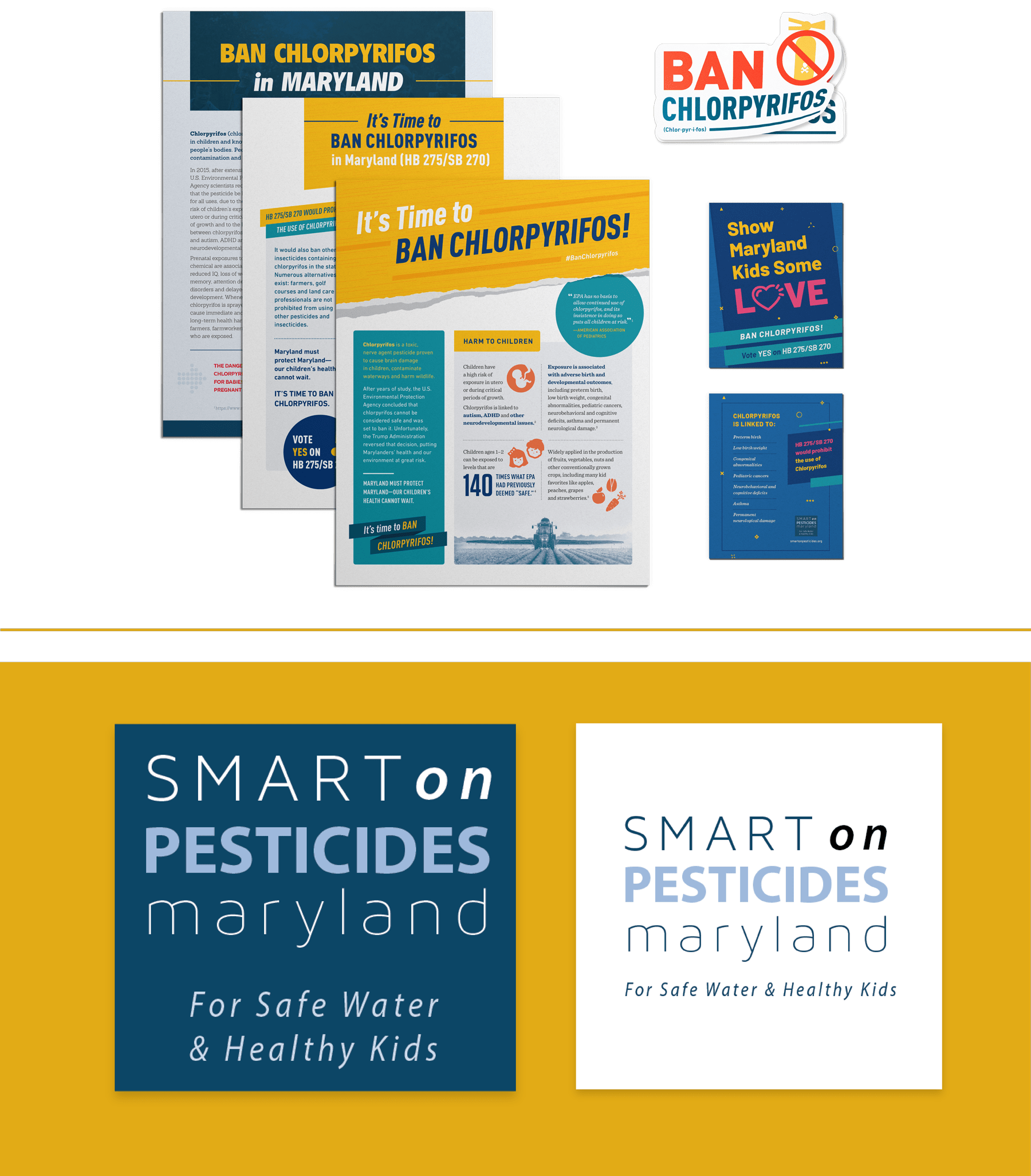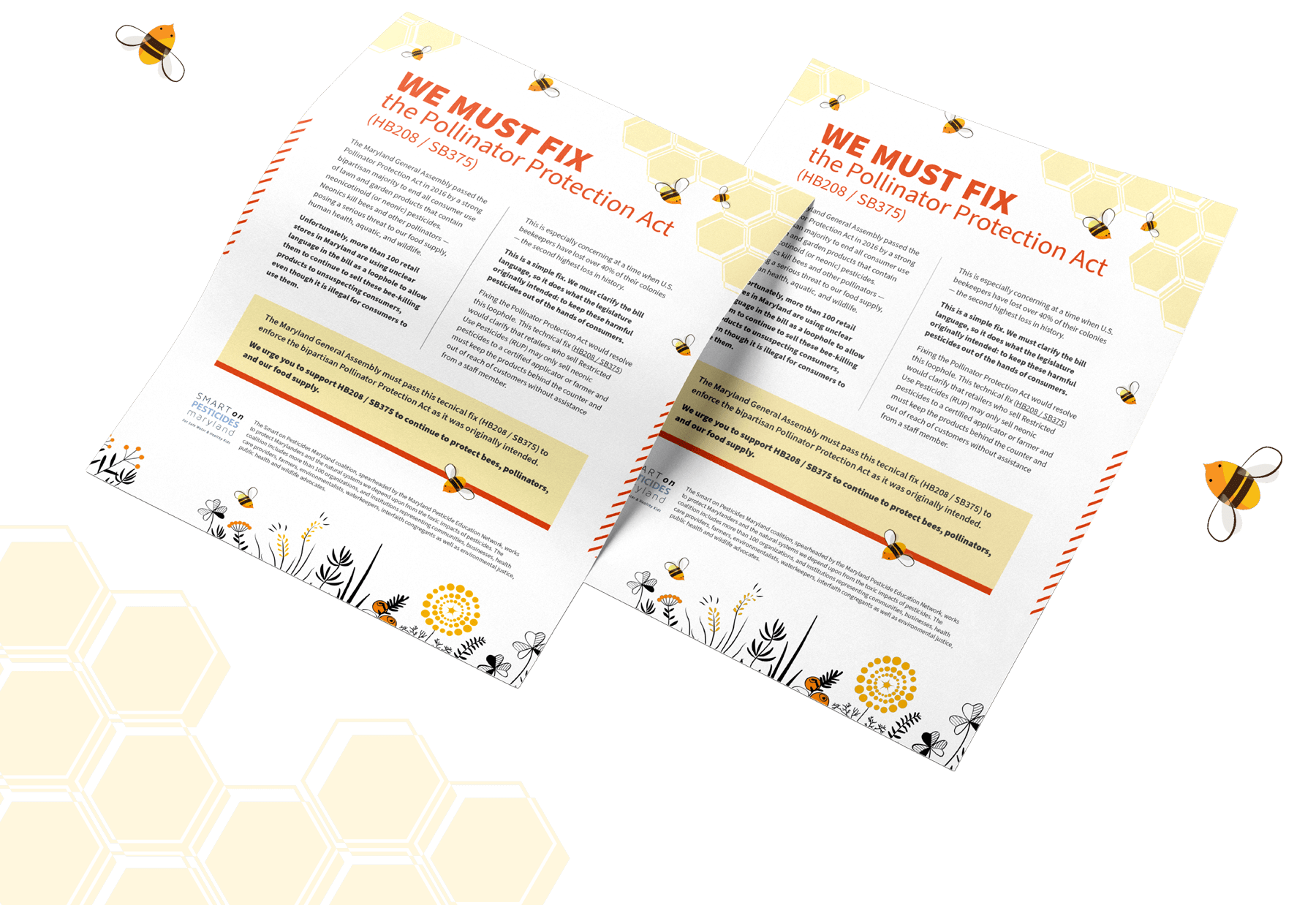Smart on Pesticides Maryland
Overview
Since 2012, The Hatcher Group has helped the Smart on Pesticides Coalition pass several important bills to protect the public from dangerous pesticides.
To protect public health, the Chesapeake Bay, local waterways, and wildlife (particularly bees and other pollinator from dangerous pesticides, the Maryland Pesticide Education Network (MPEN) launched the Smart on Pesticides Maryland Coalition in 2012. The Hatcher Group has worked with the coalition since its inception, helping educate the public, influence policymakers, motivate advocates, garner media coverage, and score major legislative victories in Maryland to protect the public from toxic pesticides. We created and implemented communications plans and strategies; developed a campaign name and branding; redesigned the website; designed and implemented a strategic social media campaign; wrote email action alerts and other online advocacy content; drafted messaging; and created compelling materials, including infographics, fact sheets, and videos. We also conducted extensive media outreach, securing coverage in major media outlets across the country and around the world. We placed targeted ads on social media and in print publications. And we grew the coalition’s email lists to thousands of individuals while adding thousands of followers on social media.
Capabilities
Earned Media
Public Affairs
Strategic Communications
Strategic Events
Branding
Digital Engagement
Paid Media
Creative
Website UI/UX
Strategy
Hatcher helped launch the grassroots coalition, comprised of more than 100 organizations and institutions — including health care providers, consumers, parents and labor, environmental, agricultural, and religious groups. We helped brand and build visibility for the coalition, which works to protect the public and the environment from toxic pesticides. Employing smart communications strategies and tools, compelling messaging, award-winning designs, and trusted spokespeople, we helped the coalition pass much-needed legislation to protect Marylanders and the environment from toxic pesticides.
Creative
Hatcher developed the organization’s logo and name, the Smart on Pesticides Coalition, and created compelling materials including infographics, fact sheets, and videos to educate the public and policymakers about important legislation to curb toxic pesticide use.

Strategic Communications
Hatcher helped the coalition develop creative communications strategies to protect bees and other pollinators, species that are dying at alarming rates across Maryland. In 2016, we created a campaign that had beekeepers from across the state “swarming” to bill hearings and floor debates, lobbying legislators. Beekeepers talked to reporters, wrote opinion pieces, and inspired social media support. No one can tell the story of how devastating these unsustainable bee and pollinator losses were — and what they mean for our food supply, economy, and public health — better than the beekeepers themselves. But their actions got results: In 2016, Maryland became the first state to ban consumer use of neonicotinoid pesticides, a nicotine-related insecticide known to harm bees, birds, and other pollinators. And in 2021, the state closed a loophole in the bill. Moral: Never underestimate the power of a trusted spokesperson.

Media Relations
To build visibility of the coalition’s important work, Hatcher developed targeted media lists, pitched top environmental and health reporters, and wrote press releases, Op-Eds, and Letters to the Editor. This resulted in major media coverage in targeted outlets across Maryland and throughout the country. We also placed ads in key legislator’s local papers with tailored messaging to foster support for legislation.
Social Media
For each piece of legislation, Hatcher implemented strategic social media campaigns linked to action alerts and other online advocacy content. Social media content included compelling messaging and attention-grabbing designs with motivating calls to action. We also added thousands of followers on social media and grew the coalition’s email lists to thousands of individuals.

Our Impact
- Added thousands of followers on social media.
- Grew email lists to thousands of individuals.
- Conducted extensive media outreach, securing coverage in major media outlets across the state, the country, and around the world.
- Developed smart communications strategies that helped the coalition secure major wins, including:
- Closing a loophole on retailers selling banned bee-killing neonic consumer garden products in 2021.
- Passing the Maryland Essential Workers Protection Act, which established an important temporary, emergency standard to safeguard workers, including food and farm workers, during the COVID-19 pandemic.
- Banning chlorpyrifos, a crop pesticide containing a nerve-agent proven to cause brain damage in children in 2020, making Maryland the second state in the country to pass legislation to ban the pesticide. Unfortunately, Governor Hogan vetoed the chlorpyrifos ban bill but the Maryland Department of Agriculture developed regulations to ban the toxic pesticide.
- Protecting pollinator habitats on state lands in 2017.
- Restricting consumer use of neonicotinoid pesticides, a nicotine-related insecticide known to harm bees, birds, and other pollinators in 2016.
- Passing state legislation to improve pesticide reporting in 2015.